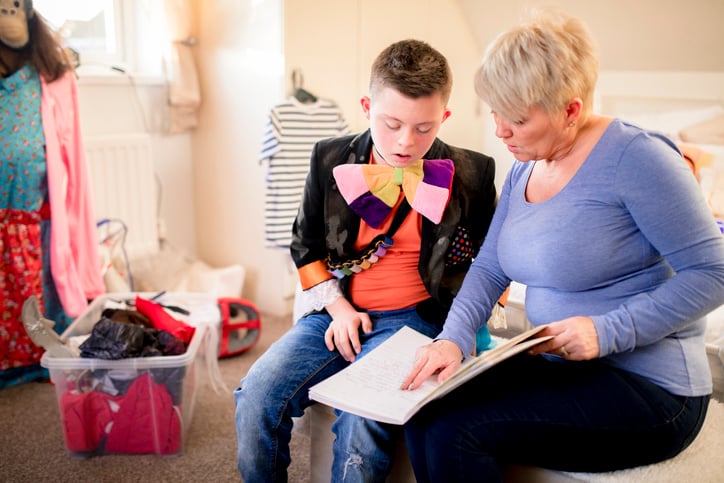Autism & Drama Therapy: A View From the Spectrum
My journey to the stage (and, lately, behind the camera) was a long one.
It began my first year in high school when I walked into my drama class and asked my instructor, Mr. Schaber, what roles were available for the upcoming fall play. An audition and the offer of a part later, I finally began acquiring the right tools I needed to function as an individual with autism in an ever-changing world.
How Acting Helped in My Personal Development
From the age of 6, when I was diagnosed with high-functioning autism, communication and socialization were easily weak points in my life. Though I had my share of friends in my upbringing, rarely could I ever connect with them on a personal level. It would be years - decades, really - before I could form a bond with another person and truly make the most of their company.
Performance, I found, proved to be the most beneficial medium when it came to my personal development. It was - and still is - an ongoing process of trial and error. Success comes with rewards, failures come with learning opportunities. There are many tools in this arena to utilize for one on the spectrum, and I've narrowed down just a few skills that can be achieved and how one might attain them.
I understand that what worked for me WILL NOT work for everyone. Each individual is different, and they need to find their strengths in their own ways.
In the meantime, for those who might show interest in this particular realm, this one's for you.

Organizational Skills
It is common for people on the spectrum to struggle with organizational skills (1) - and I'm no stranger to this struggle myself. I've always craved order in my life, but when it comes to multitasking, one such as myself can easily get lost amidst changing circumstances and priorities.
Part of an actor's life involves the constant analysis of scripts and the structuring of scenes. Scenes are often broken down into beats. Each beat has its own situation, and the actor needs to understand what is happening and how it progresses into the next beat.
One on the spectrum might approach their daily schedule in a similar manner. By breaking down and orienting the day around specific duties (breakfast, work on A, lunch, work on B, dinner, work on C, bed), one might find the structure needed to be productive and task-oriented.
The same can be said for personal development as well.
One tool actors often apply to their characters is the concept of GOTE: Goals, Obstacles, Tactics, Expectations. Every character has a goal and an obstacle standing in their way, and they must develop a set of choices to get what they want. The character may be rewarded or punished based on the outcome, but their choices will have a clear impact.
Such a concept (often written out prior) can help one on the spectrum determine what they need to do to achieve a certain result. If they are looking for a job (goal), they need to know what they’re up against (obstacle), what they need to do (tactics), and what they can expect as a result (expectations).
In terms of keeping business together, both onstage and offstage, these tools have proven priceless.

Communication Skills
Believe it or not, I have a phobia of speaking in front of audiences. Even today, I perform with my glasses off to not see those in attendance.
Unlike many others, I faced the same anxieties in my youth when merely speaking to peers - and I still do. Individuals with autism are known to avoid eye contact or look directly at the lips (2). I myself tend to focus on lips as they're the only portion of the human face that's active and moving (eyes are boring, I find).
However, proper investment in performing arts can prove very beneficial for those on the spectrum trying to communicate with others. Through constant rehearsal and repetition, one with autism can master eye contact and speech patterns to create bridges with another party.
The continual review and analysis of scripts also offer ways to experiment with diction. I've been known to speak fast and slur my words at times, but through pre-show facial warm-ups, I can speak clearer and slower in delivery. This is something I do even off-stage, and it has proven quite helpful for important matters, such as job interviews.
Moreover, the constant analysis of scripts allows one on the spectrum to understand sentence structure and vocal delivery better. Those who’re talkative, for instance, might learn how to break down sentences into separate units while also allowing another to speak to receive more information. Those who are not so talkative may learn how to formulate proper sentences before delivering them to another party.
The key is to learn how to effectively speak and listen to another party, and this is how actors engage each other during any performance.
Empathy Skills
Even today, I have trouble interpreting the personal boundaries of other people. This was certainly the case in my teens and 20s - and I confess, I lost more friends than I made in those years.
As an actor, however, it is my job to get into the head of my characters and the world they live in. Grady's needs are simple - food, water, and clothing (and maybe some blues music in the background). A character's needs may be similar to my own, but we will likely approach life and stressful situations differently.
More importantly, this process may help one on the spectrum pick up on hidden cues that are otherwise lost on those on the spectrum.
For instance:
"I’m doing fine."
The words on the surface are simple, but depending on the context of the scene, these three words can also mean the following for the character:
"I want you to go away. I'm just repeating this sentence for the 100th time. I could be somewhere else right now, but I'm stuck with you instead."
There’s no shortage of moments in my life where I’ve come across this. I frequently missed the subtext and shrugged off their demeanor, only to get on their nerves the next second with almost no warning.
Yet, this is how we communicate every day. A script easily offers a template for one on the spectrum to draw on when it comes to understanding the mindsets of others. As they familiarize themselves - as I have - with how people react in certain situations, they might be able to apply their findings to similar events in real life.
A simple “I’m doing fine” can be honest, but it can also be a cry for help, and the interaction is rewarding once they realize you’re there to help.

One Final Caveat
I must stress once more that what worked for me will not always work with others. Some might blossom with such a medium, but others might shut down completely.
Though I myself flourished as a performer, I remain very dyslexic in other areas of life. I struggle at work and always struggle to communicate my thoughts to others. Thankfully, so does everyone else.
Such a journey will be one of trial and error and constant repetition. Indeed, there will be a lot of errors and a lot of misunderstandings. Nevertheless, this is where the learning process kicks into high gear. Once the individual in question masters these skills off-stage, the rewards will be priceless in the form of life experiences and, best of all, friends for life.
We hope you enjoyed the information in this article. STAGES® Learning also offers free downloadable resources to support teaching and learning with individuals with autism. Start with our free Picture Noun Cards and see our collection of other downloadable resources here!





